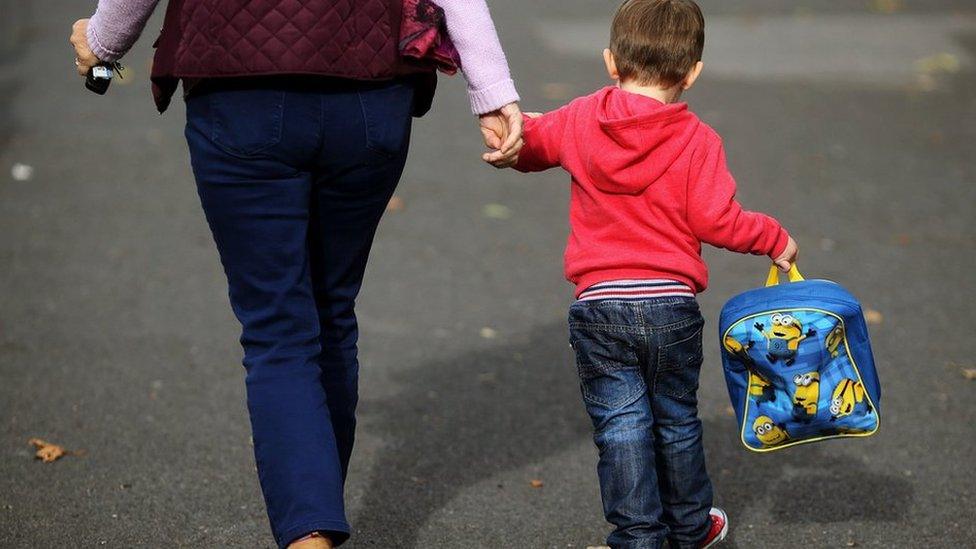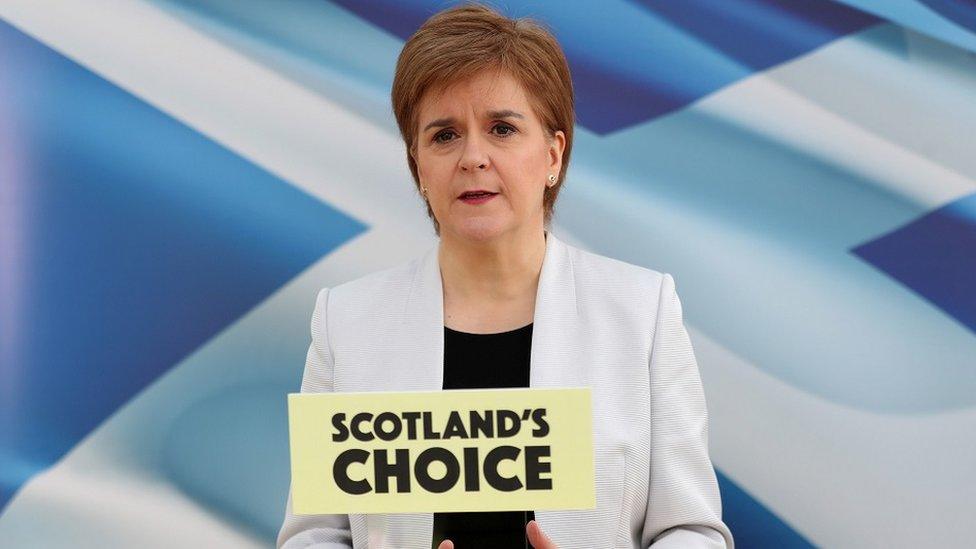Child payment rollout hindered by data concerns
- Published

The Scottish child payment began with under sixes but it is hoped it will be extended to under-16s
The rollout of a benefit aimed at tackling child poverty in Scotland could be in jeopardy unless eligible families can be identified, according to a House of Commons committee.
The Scottish Child Payment was introduced in February by the Scottish government for children under six.
The £10-a-week benefit is expected to be expanded to include children aged six to 16 by late 2022.
But data-sharing between the UK and Scotland have caused concerns.
The agency set up to administer the new devolved benefit, Social Security Scotland, needs data from the UK-wide Department for Works and Pensions (DWP) to be establish who should get the new payment.
The Scottish Affairs Committee at Westminster said: "Without this data, the Scottish government would be unable to deliver its commitment to extend the child benefit to this age group."
The committee's review into welfare policy in Scotland said that the devolution of welfare powers to the Scottish government was "working well", despite "highly regrettable" delays in the Scottish government taking full control of disability benefits.


Overall, the committee's review of how welfare is being devolved in Scotland holds many positives for both the Scottish and UK governments.
It found that, despite clear political differences and approaches, both governments are working together to deliver a safe and secure social security system. There is "little evidence" their differences have any impact on how benefits are being delivered.
However, there are still problems, not least the delay in fully devolving some disability benefits until 2025. The Scottish government has blamed Covid but the report notes that these were decisions made before the pandemic.
Both governments must also do more to make people fully aware of what they are entitled to.
However, one of the more pressing matters is the issue of sharing personal data between the two welfare agencies - issues brought on by legal concerns on the part of the DWP or the data simply not existing.
These delays could hinder the Scottish government's aims to introduce its flagship Child Payment to older children by 2022.
With child poverty in Scotland is rising despite the Scottish government's own strict targets to reduce it, the committee has urged the UK government to do all it can to solve the data problem.

Sharing of data
In March, Scotland recorded a gradual rise in child poverty between 2017 to 2020.
It is estimated that 240,000 children were living in relative poverty before the pandemic, two-thirds of those in working families.
The Scottish government said the new benefit was a "critical" part of its efforts to tackle child poverty.
The rollout of the Scottish Child Payment for children under six used data that was gathered by the UK government to administer maternity grants to the Scottish government so they could deliver their Best Start Grant benefit.
The DWP said such data for older children "does not necessarily exist" in a form that can be directly transferred to the Scottish government.
They said gathering such data would be "more challenging than perhaps the political people would want to hear".
The Scottish Affairs Committee report said it expected the DWP to prioritise and look for ways to expedite the sharing of data it does hold.
"However, we also note that the Scottish government cannot reasonably expect the DWP to share data they do not hold or that would breach their data protection obligations," it said.

The Scotland Act 2016 devolved some welfare powers to the Scottish Parliament.
SNP MP Pete Wishart, chair of the Scottish Affairs Committee, said: "What we heard was that the devolution of benefits is working well, and we commend the Scottish and UK governments working together to make this a success. However, we also heard that it is incredibly complex to unpick what claimants can access under both systems.
"Communications must be improved, and staff appropriately trained to offer consistent advice to claimants in their time of greatest need."
He added: "Worryingly, our committee heard how the support provided by benefits such as Universal Credit is simply not enough for families to feed themselves, and we urge the UK government to review making the £20 weekly uplift permanent."
A UK government spokeswoman said: "We will consider the findings of this report and respond in due course."
A Scottish government spokeswoman said devolved benefits were a joint programme between the UK and Scottish governments.
"It is important to note that this is not a 'lift and shift' of a service - we are building a brand new public service from scratch including a new agency," she said.
"The work is complex and our delivery timelines are as ambitious as possible while making sure that we do this in a responsible way and protect people who are reliant on payments."
- Published25 March 2021

- Published15 February 2021

- Published29 March 2021
